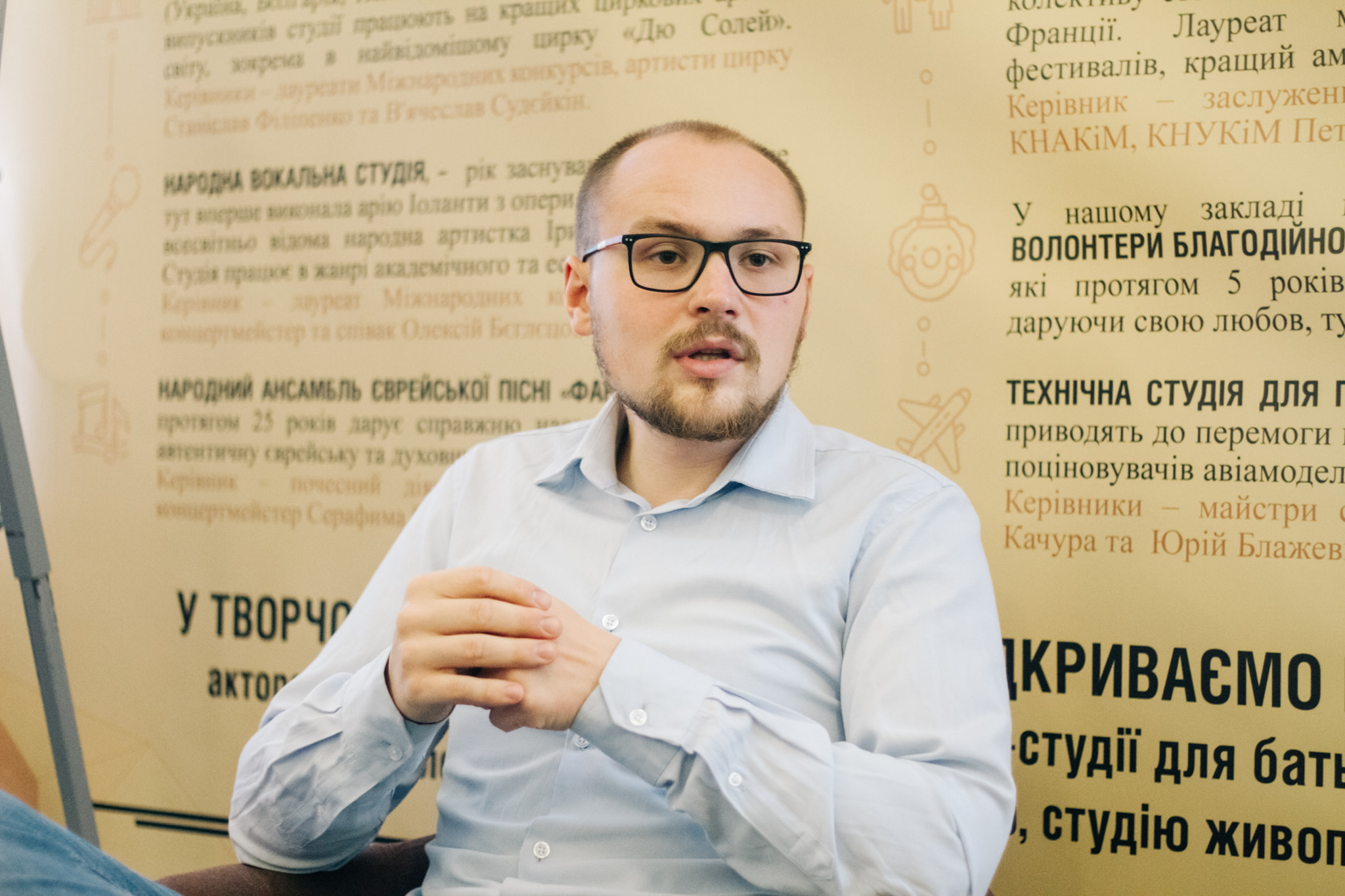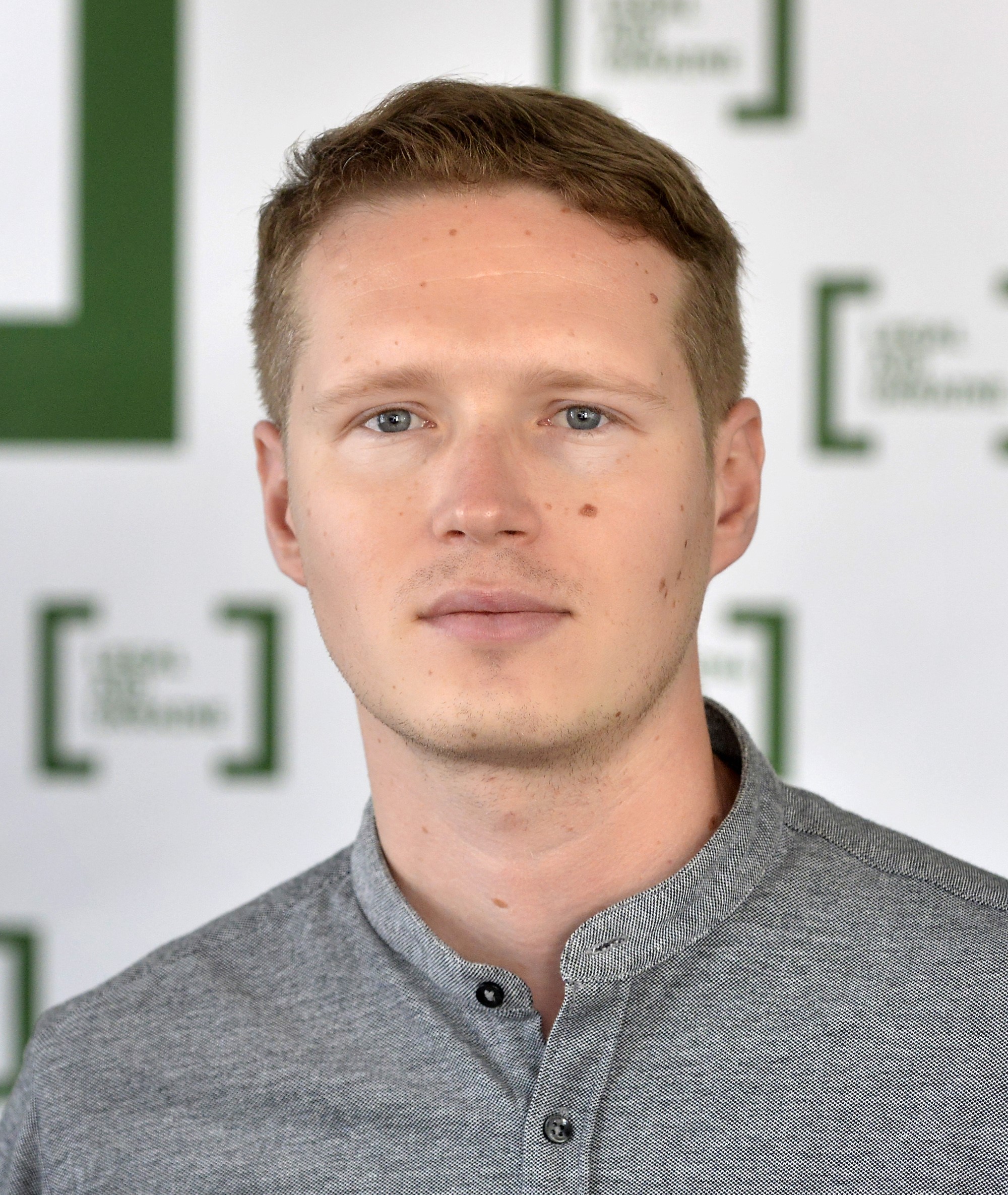“People are the source and the clients of all reforms”
Oleksandr Solontay, an expert from the Political Education Institute, noted that people are the source and the clients of all reforms. He emphasized that it is very important to spread best practices, particularly through screenings and discussions of documentary films which can increase the number of active people and from which they can adopt proactive behaviour.

“Film clubs, advocacy campaigns or any other forms of activity at the level of local self-government are a process of initialization, a process of becoming a citizen, when you take small, simple examples and start to realize that you can influence something.
It starts at the local level, when the stereotype that you cannot influence reforms is debunked. There is a process of decentralization, the government is becoming closer to the people; and a process of democratization, more people dare to use the human rights mechanisms.”
“One of the important indicators is the participation of young people”
Yevhen Bondarenko, the acting director of the public All-Ukrainian Youth Centre, emphasized that an important issue is the effective inclusion of youth in social processes.

“We already have the Strategy for the Development of Youth Policy 2030, approved by the Cabinet of Ministers of Ukraine. The new programme, Youth of Ukraine 2021–2025, is being developed. One of the important indicators is the participation of young people. The participation can be in local or student self-government, decision making about changes in their own community, organizing events which will encourage youth to be more active.
The development of Docudays UA film clubs at the level of youth infrastructures, at youth centres, which have already been established by a Cabinet of Ministers decree, can become a very powerful tool, when we can raise certain questions through cinema, discussion, complex meanings, and every young person can become a participant of their community’s life. This will shape effective change.”
"Huge rocks of issues that are silenced—bullying, domestic violence, cyberbullying (61% of people who come for free legal assistance are women)”
Serhiy Yushchyshyn, a deputy director of a coordination center for providing assistance according to the System of Free Legal Assistance, said that people who come to their center are mostly low-income people, people with disabilities, participants of military operations, internally displaced people, and 61% of them are women.
People are the most interested in civil law issues: concluding and terminating contracts, compensation for material and moral harm; family law: child support, divorce; inheritance law: inheritance, social welfare, etc. There have also been over 2 million requests for primary legal assistance, explanations, consultations. The lockdown has shown that people are helpless because they do not know their own rights, particularly the labor law. People did not know how to identify problems. The future lies in working with the hot topics which emerged with COVID-19.

“We saw that the format of human rights film screenings is effective. There is high demand for this format in particular. At least 16 Docudays UA Human Rights Media Education Film Clubs work within our System. We thank the DOCU/CLUB Network for working with us and helping us raise the huge rocks of issues that are silenced in society: bullying, domestic violence, cyberbullying. Even though we communicate about these issues a lot, the percentage of requests to the FLA System remains low. It is far from the real statistics, the data on domestic violence first of all.”
“The instrument of documentary films and human rights media education is an important discovery for the free legal assistance system”
Khrystyna Hataliak, the moderator of a film club at the Second Lviv City Centre for Free Secondary Legal Assistance, noted that film screenings and discussions help to professionally communicate human rights issues to the audience and discuss the problems of human rights and their violations with them.
“The films we used were so telling for our audience (school and university students, employees of the free legal assistance system) that using those examples, based on the discussions and group work, children and students understood what human rights are through practical tasks, and learned new skills for protecting them. We don’t just organize human rights education events, we also talk about the opportunities for receiving free legal assistance for citizens, we tell them how it should happen, involve lawyers in screenings who can consult them.”
“They don’t learn from textbooks, but from real stories of real young people who encourage you to positive change”
Ihor Andrushko, the deputy director of the Public Institution “Probation Centre,” shared an opinion that the form of screenings and discussions of documentaries is effective and probably the most useful among the instruments of human rights education for the clients of probation centres.
“As you watch a film, the system of receiving information through the lens of your own worldview activates, people start thinking about the film and draw certain conclusions. The system of discussions using the ‘equals to equals’ model also works. The clients of the centres discuss problematic aspects and develop a solution together to use it in their future lives.”
Olena Udovytska, the moderator of the film club at the Kremenchuk Educational Colony, says: “The Kremenchuk Educational Colony is for boys aged 14 to 22. Our main task is to prepare the boys for release, to develop the required social and life skills which will help them to be full and equal members of society and not to commit crimes anymore. One of the forms of our work is watching Docudays UA documentaries.
The young men think about what they would do if they were the protagonist, or, on the contrary, can understand the feelings of victims, learn empathy. They find themselves and cases from their own lives, they have the opportunity to look at themselves from the outside. The guys say that the most important thing is that they don’t learn from textbooks, but from real stories of real young people who encourage you to positive change, to learning, to mastering new professional skills, to gaining knowledge about human rights.”
“Educational projects should teach children from a very young age to understand community participation”
Ivan Fursenko, the first deputy head of the Executive Directorate of the All-Ukrainian Association of Communities, noted that educational projects should teach children from a very young age to understand what community and local self-government is; for older grades, it should teach them how budgets are formed, how they are spent, how the powers are distributed between the state and the local self-government, etc.
“The DOCU/CLUB—For Reforms! Network is a concept of not just watching films and education, but also community influence on their surroundings”
Alla Tyutyunnyk, the director of the Docudays UA Network Department and the head of the DOCU/CLUB Network—For Reforms! project said:“After watching human rights films, people start talking a lot about, well, human rights. But for a while, it was only relevant and available in Kyiv. That is why we came up with the DOCU/CLUB Network project. Today, we have 112 human rights documentaries translated into Ukrainian. We also have scenarios for them about how to present them correctly.
The film clubs operate at schools, universities, hubs and other educational, human rights institutions, probation centres, etc. We’ve seen how cinema affects people. There are more and more supporters, people come together, share their thoughts, experience powerful emotions together, become a community.
“After screenings of Ukrainian Sheriffs across Kherson Region, and later also across Ukraine, we got an idea that the network should be changed. There should be a concept of not just watching films and educating, but also of community influence on their surroundings. Then we developed a new idea, the DOCU/CLUB Network—For Reforms!. Reforms can only happen if people get engaged. People can help the government implement reforms locally. We announced a competition for advocacy events in November 2020 and received over 60 applications from film clubs and various non-governmental organizations.”
Olena Shulha, the head of the DOCU/CLUB Network, shared: “We realized that film clubs can work on the issues of advocacy, solving problems. At film discussions we, particularly through moderators, try to explain to people that they can become the driving force of reforms.”
Svitlana Smal, the executive director of NGO Docudays, noted: “The DOCU/CLUB Network—For Reforms! project aims to promote local development and democratic reforms in the field of human rights in Ukraine using innovative intersectoral cultural education events by building the potential and increasing cooperation between amalgamated territorial communities, local government bodies, civil society representatives, government representatives.”
The DOCU/CLUB Network—For Reforms! is funded by the European Union and the National Endowment for Democracy.
